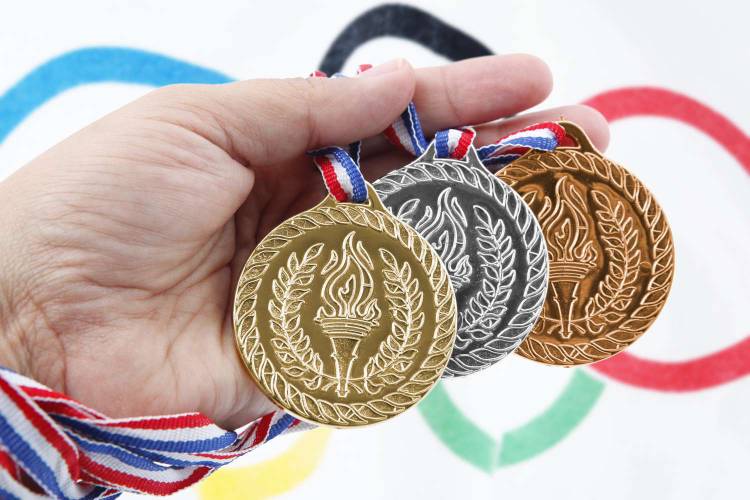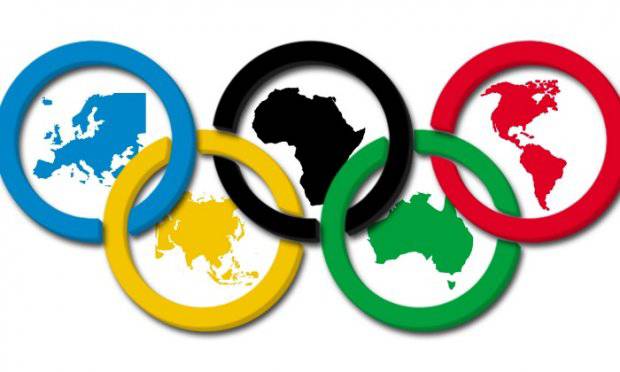The Origins of the Olympic Games
The idea of the Olympics started in ancient Greece about 3,000 years ago. The Greeks held festivals to honor their gods, and the most famous of these was the Olympic Games, dedicated to Zeus, the King of the Gods. Every four years, free men from across Greece came to Olympia in Elis to compete in these games.
The First Olympic Games
The first recorded Olympics were in 776 BC. There was only one event: a foot race called the stade. This race was about 180 meters long, roughly the length of the stadium at Olympia. A young cook named Coroebus from Elis won this race.
Growth of the Games
More events were added to the Olympics with time. These included wrestling, the long jump, the discus throw, and chariot racing. The games expanded to last five days, and the festivals went on for a month. During the games, a truce was declared across Greece. All wars had to stop, and no weapons were allowed in Olympia.
Restrictions for Women
Women were not allowed to compete in or even watch the Olympics. If they did, they faced the death penalty. Instead, women had their festival in honor of the goddess Hera. This festival happened every five years and featured a race for young girls over about 30 meters.
The Decline and End of the Games
The Ancient Olympics continued for over a thousand years but began to lose significance as the Romans took over Greece in the second century BC. Although the Romans kept the games, they damaged the spirit and traditions surrounding them. In AD 394, Emperor Theodosius, a Christian, officially abolished the Games to end pagan festivals.

Who Invented the Modern Olympic Games?
Baron Pierre de Coubertin, a passionate advocate for physical education, played a key role in reviving the Olympic Games. His interest in the Games grew after he visited an ancient Olympic site in Greece. Inspired also by the Greek War of Independence in 1821, Coubertin proposed the idea of reviving the Olympics as a major international sporting event in 1892. His proposal led to the formation of the International Olympic Committee (IOC).
The first modern Olympic Games took place in Athens, Greece, in 1896. This inaugural event featured 14 nations and 280 athletes competing in 43 sports, including:
- Track and Field

- Swimming
- Tennis
- Wrestling
- Gymnastics
- Cycling
- Weightlifting
- Shooting
- Fencing
Since then, the Games have been held every four years in a different city and country during the summer. By 1924, the Olympics had solidified its status as a premier global sporting event, with 44 nations and 3,000 athletes participating.
The Origins and Evolution of the Paralympic Games
The Birth of the Paralympics
The Paralympic Games were established in 1948, thanks to the pioneering efforts of Sir Ludwig Guttmann. His vision was to aid the rehabilitation of injured soldiers from World War II through sport.
Sir Ludwig Guttmann: The Visionary Behind the Paralympics
Sir Ludwig Guttmann, a key figure in the creation of the Paralympic Games, organized a sporting event for injured veterans that coincided with the 1948 London Olympics, marking the inception of this important global event.
The First Paralympic Games
In 1960, the first official Paralympic Games took place in Rome with 400 athletes competing. This event, initially called the “Parallel Olympics,” was a landmark moment in the history of the Paralympics.
Integration with the Olympic Games
Since 1988, the Paralympics have been held in the same city as the Olympic Games, reflecting the growing recognition and integration of athletes with disabilities into the global sporting arena.
Important Events in Olympic History
The Olympics, as the world’s premier sporting event, has witnessed significant achievements and historical moments. Here are some key events in its history:
First Women Competitors
For the first time in 1900, women were allowed to compete in the Olympic Games. Hélène de Pourtalès from Switzerland became the first woman to compete and also the first female Olympic champion.
First Cancellation Due to World War I
In 1916, the Olympic Games were canceled for the first time in history due to World War I.
Controversial Berlin Olympics
The 1936 Olympics were hosted by Nazi Germany. Many countries chose to boycott the Games due to the racist policies of the Nazi regime. Despite this, African American athlete Jesse Owens won four gold medals, a moment regarded as one of the most significant in Olympic history.
Cancellation Due to World War II
The Olympic Games were canceled again due to World War II, with the 1940 and 1944 Games being called off.
Post-War London Games
The 1948 London Olympics marked the return of the Games after World War II, with Germany and Japan banned from competing.
Black Power salute
During the Mexico City Olympics in 1968, U.S. sprinters Tommie Smith and John Carlos performed the Black Power salute on the podium to protest the treatment of Black citizens in the U.S. This year also saw protests against the use of government funding for the Games in Mexico City.
U.S. Boycott of Moscow Olympics
Amid the Cold War, the U.S. boycotted the 1980 Moscow Olympics in protest of the Soviet Union’s actions in Afghanistan.
Centennial Celebration in Atlanta
The 100th Olympic Games were held in Atlanta in 1996. During the opening ceremony, Olympic gold medallist Muhammad Ali lit the Olympic flame, marking a memorable moment in Olympic history.
Michael Phelps’ Historic Performance
At the Beijing Olympics in 2008, American swimmer Michael Phelps and his teammates set a world record in the relay event. Phelps won eight gold medals in a single Olympic Games, the most ever achieved.
Cancellation Due to COVID-19
The Tokyo 2020 Olympics were canceled due to the COVID-19 pandemic, marking the third time in history that the Games were canceled. The event was rescheduled to 2021.

List of Olympic Games (1896 – Present)
Here’s the chart including the host city and country for each Olympic Games from 1896 to 2028:
| Year | City | Country |
|---|---|---|
| 1896 | Athens | Greece |
| 1900 | Paris | France |
| 1904 | St. Louis | United States |
| 1908 | London | United Kingdom |
| 1912 | Stockholm | Sweden |
| 1920 | Antwerp | Belgium |
| 1924 | Paris | France |
| 1928 | Amsterdam | Netherlands |
| 1932 | Los Angeles | United States |
| 1936 | Berlin | Germany |
| 1948 | London | United Kingdom |
| 1952 | Helsinki | Finland |
| 1956 | Melbourne | Australia |
| 1960 | Rome | Italy |
| 1964 | Tokyo | Japan |
| 1968 | Mexico City | Mexico |
| 1972 | Munich | West Germany |
| 1976 | Montreal | Canada |
| 1980 | Moscow | Soviet Union |
| 1984 | Los Angeles | United States |
| 1988 | Seoul | South Korea |
| 1992 | Barcelona | Spain |
| 1996 | Atlanta | United States |
| 2000 | Sydney | Australia |
| 2004 | Athens | Greece |
| 2008 | Beijing | China |
| 2012 | London | United Kingdom |
| 2016 | Rio de Janeiro | Brazil |
| 2020 | Tokyo | Japan |
| 2024 | Paris (upcoming) | France |
| 2028 | Los Angeles (upcoming) | United States |
Paralympics
In 1948, The Paralympic Games were established due to the pioneering efforts of Sir Ludwig Guttmann. His vision was to aid the rehabilitation of injured soldiers from World War II through sport.
Sir Ludwig Guttmann: The Visionary Behind the Paralympics
Sir Ludwig Guttmann, a key figure in the creation of the Paralympic Games, organized a sporting event for injured veterans that coincided with the 1948 London Olympics, marking the inception of this important global event.
The First Paralympic Games
In 1960, the first official Paralympic Games took place in Rome with 400 athletes competing. This event, initially called the “Parallel Olympics,” was a landmark moment in the history of the Paralympics.
Integration with the Olympic Games
Since 1988, the same city has hosted both the Paralympics and the Olympic Games, reflecting the growing recognition and integration of athletes with disabilities into the global sporting arena.
10 Fascinating Facts About Olympic History
1. The Iconic Olympic Symbol
The symbol of the modern Olympic Games features five interlocking rings. These rings represent the continents of North and South America, Asia, Africa, Europe, and Australia.
2. Pioneering Female Participation
The 2012 Olympic Games marked a historic milestone as it was the first time all participating countries sent female athletes to compete.
3. The True Metal of Gold Medals
4. A Rare Cancellation
5. Olympic Powerhouses
Some of the most successful countries in Olympic history include the United States, China, the United Kingdom, and Russia, which are known for their impressive medal counts.
6. The Eternal Olympic Flame
The Olympic flame is an enduring symbol of the Games. Several months before the Olympia, Greece event, it burns throughout the ceremony, linking ancient traditions with the modern Olympics.
7. Gender Equality in Every Sport
With the 2012 London Olympics, women were finally allowed to compete in every sport on the Olympic program, marking a significant step toward gender equality in the Games.
8. The Longest-Standing Olympic Record
Bob Beamon’s remarkable long jump of 8.90 meters at the 1968 Mexico City Olympics remains unbeaten more than 50 years later, holding the record for the longest-standing Olympic achievement.
9. The Ancient Olympic Prize
In ancient times, winning athletes were awarded an olive wreath as their prize. This symbol of victory continues to be significant in the Olympics today.
10. Sir Mo Farah’s Track Dominance
British long-distance runner Sir Mo Farah is the most successful British track athlete in Olympic history, having won gold medals in both the 5,000-meter and 10,000-meter races.
Frequently Asked Questions about Olympic
Where Were the First Olympic Games Held?
The first modern Olympic Games were held in Athens, Greece, in 1896. Athens is the historic birthplace of the Olympics.
 Who Designed the Olympic Symbol?
Who Designed the Olympic Symbol?
In 1913, Pierre de Coubertin, the founder of the modern Olympics, designed the Olympic symbol. This is the Olympic rings symbol.
What Do the Five Olympic Rings Represent?
On a white background, the five interlocking rings are colored blue, red, black, green, and yellow. These colors represent the five continents united by the Olympics. The colors of the rings are found in every nation’s flag.
Sporting Events in the Winter Olympics:
| Column 1 | Column 2 | Column 3 | Column 4 |
|---|---|---|---|
| Alpine Skiing | Freestyle Skiing | Luge | Ski Jumping |
| Biathlon | Ice Hockey | Nordic Combined | Snowboard |
| Bobsleigh | Figure Skating | Short Track | Speed Skating |
| Cross-Country Skiing | Curling | Skeleton |
Sporting Events in the Summer Olympics
| Column 1 | Column 2 | Column 3 | Column 4 | Column 5 | Column 6 |
|---|---|---|---|---|---|
| Archery | Baseball | Boxing | Canoe Slalom | Canoe Sprint | Cycling BMX |
| Artistic Swimming | Badminton | Breaking | Cycling Mountain Bike | Cycling Road | Cycling Track |
| Athletics | Basketball | Basketball 3×3 | Beach Volleyball | Boxing | Canoe Slalom |
| Beach Volleyball | Boxing | Canoe Sprint | Diving | Equestrian/Dressage | Equestrian Eventing |
| Equestrian Jumping | Fencing | Football | Golf | Gymnastics Artistic | Gymnastics Rhythmic |
| Handball | Hockey | Judo | Karate | Marathon Swimming | Modern Pentathlon |
| Rowing | Rugby | Sailing | Shooting | Skateboarding | Sport Climbing |
| Surfing | Swimming | Table Tennis | Taekwondo | Tennis | Trampoline |
| Triathlon | Volleyball | Water Polo | Weightlifting | Wrestling Freestyle | Wrestling Greco-Roman |
10 Fascinating Facts About Olympic History
1. The Iconic Olympic Symbol
The symbol of the modern Olympic Games features five interlocking rings. These rings represent the continents of North and South America, Asia, Africa, Europe, and Australia.
2. Pioneering Female Participation
The 2012 Olympic Games marked a historic milestone as it was the first time all participating countries sent female athletes to compete.
3. The True Metal of Gold Medals
Olympic gold medals are made of silver and they are coated with a thin layer of gold.
4. A Rare Cancellation
Since 1988, the organizers have held the Paralympics in the same city as the Olympic Games. This practice reflects the growing recognition and integration of athletes with disabilities into the global sporting arena.
5. Olympic Powerhouses
Some of the most successful countries in Olympic history include the United States, China, the United Kingdom, and Russia, which are known for their impressive medal counts.
6. The Eternal Olympic Flame
The Olympic flame is an enduring symbol of the Games. Several months before the Olympia, Greece event, it burns throughout the ceremony, linking ancient traditions with the modern Olympics.
7. Gender Equality in Every Sport
The 2012 London Olympics finally allowed women to compete in every sport on the Olympic program, marking a significant step toward gender equality in the Games.
8. The Longest-Standing Olympic Record
Bob Beamon’s remarkable long jump of 8.90 meters at the 1968 Mexico City Olympics remains unbeaten more than 50 years later, holding the record for the longest-standing Olympic achievement.
9. The Ancient Olympic Prize
10. Sir Mo Farah’s Track Dominance
British long-distance runner Sir Mo Farah is the most successful British track athlete in Olympic history, having won gold medals in both the 5,000-meter and 10,000-meter races.

